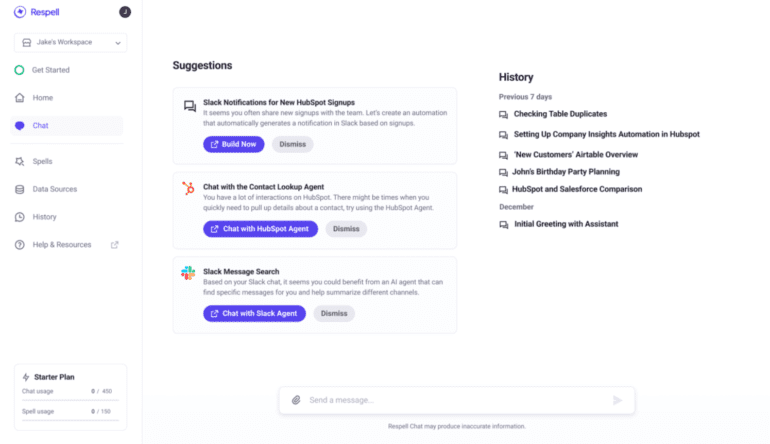TL;DR:
- Respell, founded by Matthew Rastovac, focuses on AI-powered workflows for non-technical individuals.
- The company secures $4.75 million in seed funding led by Craft Ventures.
- Respell differentiates itself by allowing users to describe tasks, automating workflow creation.
- The platform uses “spells,” customizable workflow templates, and predominantly employs GPT-4 as the language model.
- Craft Ventures investor, Sean Whitney, praises Respell for making AI accessible to all.
- Respell, launched last year, emphasizes cautious growth tied to financial performance.
Main AI News:
In the realm of AI-powered workflow solutions, Respell is on a mission to empower non-technical end users. Founded by Matthew Rastovac, Respell’s roots trace back to a pivotal high school internship where Rastovac found himself manually transferring data from a government website to a spreadsheet. Recognizing the inefficiency of this tedious task, he took matters into his own hands and developed code to automate it. Fast forward to today, Respell leverages the capabilities of generative AI to enable individuals without technical backgrounds to streamline and automate their workflows effectively.
In an exciting development, Respell has just secured a substantial $4.75 million in seed funding, with Craft Ventures taking the lead and support from a lineup of prominent industry angels. This infusion of capital is a testament to the promising future that lies ahead for Respell and its innovative approach.
Matthew Rastovac, the driving force behind Respell, emphasizes their distinctive approach in the AI automation landscape. He acknowledges that the term “workflows” has become somewhat overused, but Respell stands out by putting non-technical users at the forefront of their mission. “Respell is using AI automation to help build workflows. It’s a pretty overplayed term at this point, but I think we’ve approached it a little bit differently, where we focus very strongly on non-technical folks,” Rastovac shared with TechCrunch.
Rastovac’s insight stems from a recognition that many existing tools in the market are engineered by and for engineers, leaving non-technical users at a disadvantage. Respell aims to shift this paradigm by harnessing the potential of generative AI to empower users to swiftly create workflows. Users need only describe their intended tasks, and Respell’s software takes care of the rest, generating and customizing workflows as needed.
Traditionally, non-technical users have relied on a drag-and-drop approach to build workflows, often involving manual configuration. Respell revolutionizes this process by enabling users to describe their workflow objectives and then automating the construction of those workflows, offering flexibility for further adjustments.
At the core of Respell’s approach are what they call “spells,” which are essentially customizable workflow templates. Users can either create their own spells or utilize prebuilt ones, providing a seamless experience tailored to their specific needs. When it comes to the underlying language model (LLM), Respell strives for agnosticism and aims to collaborate with major players in the field. Currently, GPT-4 stands out as the most high-performing model in use.
Investor Sean Whitney from Craft Ventures recognizes the transformative potential of Respell’s approach, stating, “While recent developments in AI present massive transformational potential, there is one big problem: it’s challenging for the vast majority of people to tap into that potential. Respell makes it easy for anyone to utilize powerful AI in customizable and personalized ways.”
Having launched just last year, Respell introduced its first version in March, reaching general availability by August. With eight full-time employees on board, Rastovac is taking a cautious approach to growth, prioritizing financial performance as the driving force behind any future hiring decisions. Respell’s journey continues to evolve, promising a future where AI-driven workflows are accessible to all, regardless of technical expertise.
Conclusion:
Respell’s innovative approach to AI-powered workflow automation addresses the challenge of accessibility for non-technical users. By simplifying the workflow creation process and offering customization through “spells,” the company is poised to disrupt the market, making AI-driven workflows more widely available and user-friendly. This marks a significant shift towards democratizing the power of generative AI in the business world.

